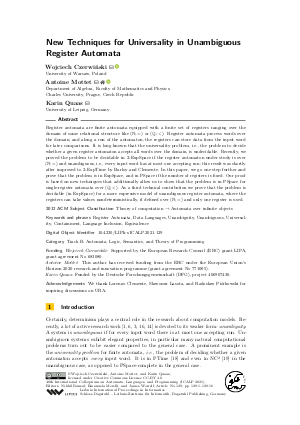@InProceedings{czerwinski_et_al:LIPIcs.ICALP.2021.129,
author = {Czerwi\'{n}ski, Wojciech and Mottet, Antoine and Quaas, Karin},
title = {{New Techniques for Universality in Unambiguous Register Automata}},
booktitle = {48th International Colloquium on Automata, Languages, and Programming (ICALP 2021)},
pages = {129:1--129:16},
series = {Leibniz International Proceedings in Informatics (LIPIcs)},
ISBN = {978-3-95977-195-5},
ISSN = {1868-8969},
year = {2021},
volume = {198},
editor = {Bansal, Nikhil and Merelli, Emanuela and Worrell, James},
publisher = {Schloss Dagstuhl -- Leibniz-Zentrum f{\"u}r Informatik},
address = {Dagstuhl, Germany},
URL = {https://drops.dagstuhl.de/entities/document/10.4230/LIPIcs.ICALP.2021.129},
URN = {urn:nbn:de:0030-drops-141983},
doi = {10.4230/LIPIcs.ICALP.2021.129},
annote = {Keywords: Register Automata, Data Languages, Unambiguity, Unambiguous, Universality, Containment, Language Inclusion, Equivalence}
}

 Creative Commons Attribution 4.0 International license
Creative Commons Attribution 4.0 International license












